
views
X
Research source
Education and Certification

Choose an appropriate major. While there aren't necessarily any specific education requirements for a credit repair specialist, most people working in the industry have at least a bachelor's degree in a finance-related discipline. If you're still in school, or thinking about going back to get a degree, focus on courses in personal finance and the consumer credit industry. Take courses on bankruptcy, taxes, and other legal issues that may impact clients with poor credit. Learn how to negotiate effectively on behalf of your clients, and how to communicate clearly and effectively in writing.
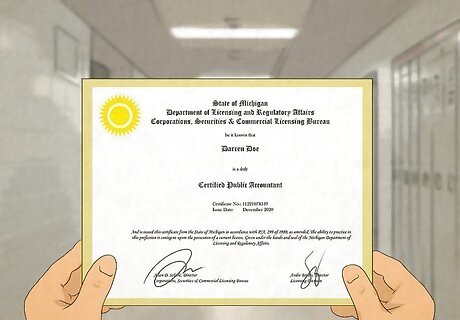
Get additional credentials if desired. If you're interested in further education, becoming a certified public accountant (CPA) or getting a law degree can advance your career. These credentials also allow you to offer a wider range of services to your clients. Recognize the investment involved and determine whether it's worth it. It's often better to start working after you get your bachelor's degree. If you decide after working that you want additional credentials, you can look into part-time programs.

Become certified. While certification typically is voluntary, going through a certification program can improve your reputation as well as educate you on issues specific to the consumer credit industry. Since certification is completely voluntary, there are a number of different companies that offer licensing or certification programs. You can review these programs online to choose the one that is best for you. You might also look at which programs are more popular with established credit repair specialists in your area. If there's one certification more popular than others, it will be better recognized by potential clients. Expect to spend time studying for an exam and to pay a fee, typically a few hundred dollars or less, for certification.

Use continuing education to your advantage. Many certification programs require you to take a certain number of hours of continuing education each year to maintain your license. These courses keep you up to date on the latest issues and trends in the personal finance sector. Look for classes or programs that directly impact the types of clients you have or want to attract. Brainstorm a list of other legal and financial problems typically faced by your clients, and keep up to date there as well.
Joining an Established Credit Repair Agency
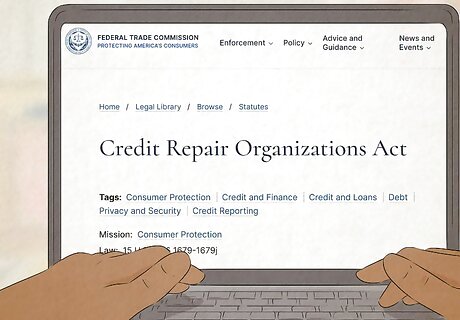
Review applicable laws. Credit repair is a highly regulated business. As a credit repair specialist, you must understand what laws apply to your business even if you're working as an employee for someone else. For example, if you're based in the United States, there are federal and state laws that regulate the credit repair industry. These laws dictate what you can promise your potential clients and how you can advertise your services. If you run across a credit repair agency that is operating outside the bounds of the law, don't work for them. Being associated with such a firm could have a serious negative impact on your reputation, and could potentially get you into legal trouble.

Search for local agencies. Typically legitimate credit counseling or credit repair agencies must be licensed by the government. Your government consumer finance department typically has a list of legitimate agencies in your area. Search online for these agencies and check their websites to see if they're hiring. You can also simply call or drop by in person to inquire. If you contact an agency, be professional. Tell them immediately that you are looking for a job so they know you are not a potential client.

Check into the agency's background. Before you interview with any credit counseling or credit repair agency, review their background and reputation as though you were a potential client. Find out if there have been any complaints against the agency, and what former clients are saying about the agency's services. If the agency has been reported to government authorities, or if it has a significant number of disgruntled clients, that may be a warning sign that the agency isn't entirely above-board. Look carefully at the agency's website and other marketing materials and pay attention to what they're promising or guaranteeing for their clients. Many complaints may be related to unreasonable expectations.
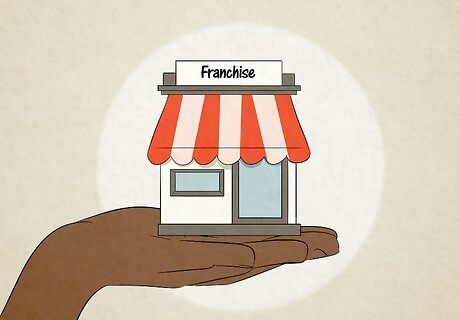
Consider buying a franchise. Many established credit repair agencies have franchise opportunities available. These may require a larger initial investment than if you started a business on your own. A franchise is something of a hybrid between starting your own independent business outright and joining another agency as a paid employee. On the one hand, you'll be your own boss. On the other, you'll be selling services with an established brand and reputation. As with joining an established agency as an employee, look carefully into the reputation of any franchise opportunities. The primary thing a franchise offers you as a credit repair specialist is an established reputation – make sure that reputation is something that will actually benefit you.
Starting a Credit Repair Business

Consult practicing credit repair specialists. An established and reputable credit repair specialist can help you get your business started. Someone local to you will have an understanding of the rules and regulations that will apply to your business. Research the specialist's background just as if you were thinking about hiring them yourself. Make sure anyone you interview has a good reputation in the business. Especially when you're just getting started, you may want to consider partnering up with an established credit repair specialist so you can learn the ropes.

Identify your niche. There are a lot of credit repair businesses out there. If you want to start your own, you'll get a lot further if you target specific types of consumers. For these consumers, you bring a more in-depth understanding of their financial issues. Rely on your own experiences to help find your niche. For example, if you recently had to repair your own credit following a divorce, you may want to focus on clients who are recently divorced. Your experience gives you more empathy and understanding for these clients and the issues they face.
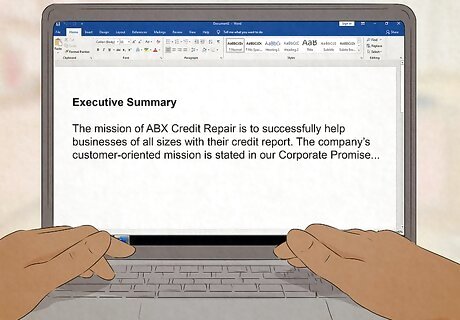
Create a business plan. Although you can start your own credit repair business with little to no start-up funding, a formal business plan keeps you organized. Use your business plan to set realistic goals for your business, and lay out the steps to achieving those goals. As part of your business plan, you'll also have the opportunity to do a little market research so you can determine how much you can charge for your services and what specific services you should offer. Start small and don't take on too much until your business is more established. Pay attention to any start-up costs associated with your business, and determine how to get the funding you'll need. Most independent credit repair businesses don't require a lot of start-up investment at first, but there may be licensing or registration fees.
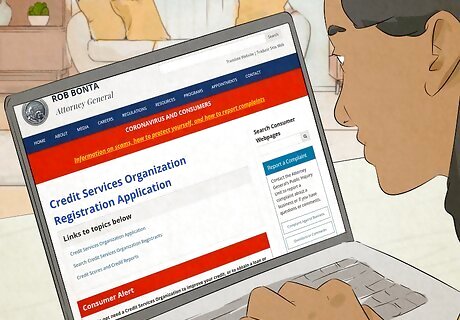
Check applicable laws. In some locations, you may be required to register or apply for a license with local, state, or national governments. If you run your own credit repair business, it's up to you to get any licenses you need. If you're located in the United States, you typically can find out what licenses you need by looking on the website of the attorney general's office for your state. Some local governments also may require you to be licensed as a home business, particularly if you plan to meet with your clients at home. You also need to get required tax identification numbers so you can accurately report the income you earn from your business to state and federal governments.
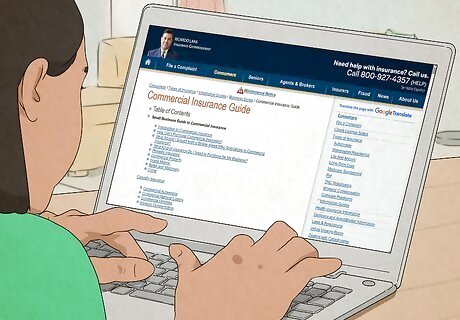
Get any required insurance or bonding. The government may require liability insurance or other business insurance to protect both you and your clients from any mistakes you might make that would negatively impact their credit. Even if you aren't required by law to purchase liability insurance, you still should consider it a necessity. Premiums typically aren't very high, and the coverage can save you a lot of money if you happen to get sued. The way you organize your credit repair business also affects your personal liability. By default, your business will be considered a sole proprietorship, which means that any disgruntled clients can potentially sue you personally. Consider organizing as an LLC to limit your personal liability and keep your business operations separate from your personal finances.

Build a list of contacts at credit reporting bureaus. As a credit repair specialist, you can expect to contact the credit reporting bureaus numerous times on behalf of your clients. Try to work with the same people regularly to establish a collegial working relationship with them. Ask customer service representatives if you can contact them directly when you have inquiries on behalf of a client. Send a short thank you note or email when someone is especially helpful. For example, you might write "Thank you for your assistance with correcting the errors on Sally Sunshine's credit report. With your help she was able to refinance her house. I look forward to working with you again in the future."
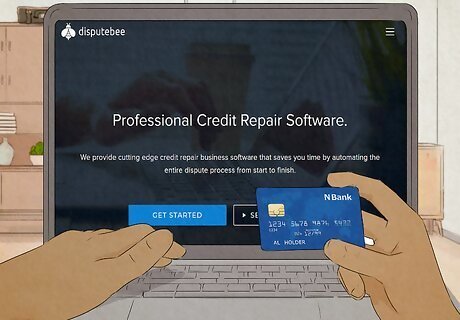
Subscribe to business software and services. There are a lot of companies out there marketing apps and subscription-based web services to independent credit repair specialists. Take some time to evaluate these products so you can choose the ones that will actually benefit you and your clients. Many products offer a free initial trial period. Take advantage of these trials so you can decide which products work best for your business. Mark the dates the trials expire and set reminders, since many of them automatically bill a subscription when the trial is over. Even if you don't get specific credit repair software, you'll still need basic business accounting software to keep your business's finances organized. This also helps you ensure that you're tracking and claiming all possible business deductions on your taxes.

Get your first clients. To get your credit repair business off the ground, you need references from clients you've helped. Credit and finances are a personal matter, and people aren't likely to hire you without proof that you can be trusted. A blog can be a good way to get started and promote yourself online. If you offer financial advice, you can demonstrate your knowledge and expertise. Include a note at the end of each blog post advertising your services. You can use social media platforms to reach target consumers and potential clients, but focus on one or two platforms rather than trying to have a presence on all of them. Make sure you're able to keep up with your accounts and contribute to them in a consistent way. You also may be able to sign up with referral services that will send clients your way. Most of these services charge a fee, so research them carefully before signing up so you know exactly what you're paying for.



















Comments
0 comment